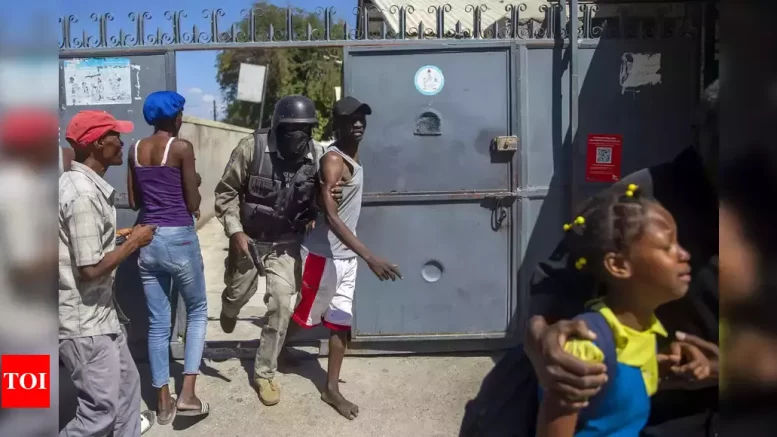Haiti finds itself engulfed in chaos and violence, prompting the government to declare a state of emergency and impose a nighttime curfew in a desperate attempt to restore order. The escalation of violence reached a critical point over the weekend when armed gang members executed coordinated attacks on the nation’s largest prisons, resulting in the mass escape of thousands of inmates.
In response to the crisis, the government swiftly implemented a 72-hour state of emergency, with the primary objective of locating and apprehending the escaped criminals, including murderers, kidnappers, and other violent offenders. Acting Prime Minister Patrick Boivert emphasized the imperative for law enforcement to utilize all available legal means to enforce the curfew and apprehend perpetrators.
This surge of violence represents a new nadir in Haiti’s ongoing descent into lawlessness. Beginning on Thursday, gangs intensified their assaults across Port-au-Prince, coinciding with Prime Minister Ariel Henry’s diplomatic efforts abroad to rally support for a UN-backed security initiative aimed at stabilizing the nation.
Former elite police officer Jimmy Chérizier, also known as Barbecue, has claimed responsibility for orchestrating the wave of attacks. His stated aim is to seize control of Haiti’s law enforcement leadership and government ministers while preventing Henry’s return.
The weekend’s violence claimed at least nine lives, including four police officers, with targets ranging from police stations to the national soccer stadium. However, the brazen siege on the National Penitentiary on Saturday night shocked even the most hardened Haitian residents accustomed to pervasive violence.
Nearly all of the approximately 4,000 inmates staged a jailbreak, leaving the facility deserted and unguarded, with only three bodies with gunshot wounds remaining at the entrance. Another prison in Port-au-Prince, housing around 1,400 inmates, suffered a similar fate.
Reports indicate that the overwhelming majority of inmates have fled, leaving fewer than 100 incarcerated. Among those who chose to remain were 18 former Colombian soldiers implicated in the assassination of President Jovenel Moïse in July 2021.
The violence on Saturday night extended to various neighborhoods, with gunfire echoing throughout the city. Additionally, disruptions in internet service compounded the chaos, with a major mobile network attributing the outage to damage inflicted during the rampage.
These recent attacks underscore the escalating boldness of the gangs, which have targeted state institutions previously considered untouchable, such as the Central Bank. Meanwhile, Prime Minister Henry’s administration faces mounting pressure to address the security crisis amid prolonged delays in organizing parliamentary and presidential elections.
The Haitian National Police, comprising roughly 9,000 officers tasked with safeguarding over 11 million citizens, finds itself consistently overwhelmed and outmatched by the organized crime syndicates, which reportedly exert control over up to 80% of Port-au-Prince.

